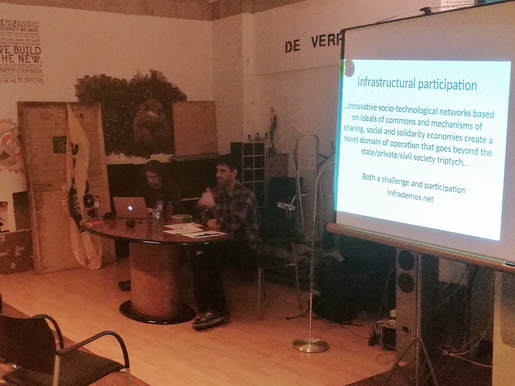|
Blog by Christos Giovanopoulos
On Tuesday November 21st infra-demos project went public for the first time in the squatted social centre De Verrekijker in the Vrije University Amsterdam. The research team, comprised by Prof. Dimitris Dalakoglou, post-doc Yannis Kalianos and the PhD researcher Christos Giovanopoulos, presented the basic outline and objectives of the project. The infra-demos research team presented the approach of the program based on an analysis of the transition from infrastructural Gap to new participatory forms of infrastructures. Dalakoglou introduced the notions of infrastructural gap and infrastructural citizenship as the two central pillars that will be employed in the research. He also pointed out the techno-social conceptualization of infrastructures, as means for maintaining or challenging social consensus and political order. By analysing the crisis of the dominant infrastructural model in recent years and by focusing on the potential of emerging infrastructures based on social participation, the project aims to bring to light alternative models of infrastructural democracy beyond the state and the market frameworks and to examine also their viability to evolve and upscale. As the primary research field would be in crisis ridden Greece, he also addressed the relevance – and not exclusivity – of the Greek case for the rest of Europe regarding shifting patterns and re-modeling of the dominant infrastructural model and policies. Kallianos focused on “large” (scale) or “hard” infrastructures as a site of socio-political contestation during times of crisis. He referred to a series of “infrastructural conflicts” occurred in Greece since 2010, which while challenging the dominant political imaginaries opened also a space for social participation and antagonistic models and concepts of infrastructures to emerge. In that respect, they provide material for a (re-)conceptualization of the politics of infrastructure, which infra-demos aspires to bring to the fore. Giovanopoulos presented the plethora of grassroots social solidarity structures created by popular initiative to respond to a severe crisis of social reproduction in Greece. Such examples have nurtured “soft” infrastructures and a practice of infrastructural consolidation mingled with practices of grassroots democracy. As such they suggest a rather integrated and organic process through which local communities renegotiate (and reclaim) their techno-social relationship with the infrastructural domain. He also briefly referred to his intended engaged and participatory methodology and its relation with the co-design and testing of upgrading and networking of the observed citizen-run infrastructural raw material. The presentations were followed by a lively discussion regarding the relationship of the crisis as a trigger for such bottom-up social inventiveness, the sustainability of such endeavors beyond the crisis, the upscaling (vi)ability, or not, of such community based examples and the relevance or peculiarity of the Greek case for other economic and socio-political contexts, to mention but a few. Regarding especially that latter question, two days after our event the Financial Times hosted an article that confirmed infra-demos’ argument and main hypothesis of a systemic crisis on the current infrastructural model in the case of entire Europe (Jones 2017). Rather than a coincidence, the appearance of such article grounds infra-demos research and approach to upcoming theoretical and policy making challenges. As infra-demos research team we would like to thank everyone who honored us with their presence, their remarks, questions and contributions in the launch event of infra-demos. References Europe’s spending on infrastructure at ‘chronic’ low level FT, 23 Nov. 2017, Claire Jones in Frankfurt,
1 Comment
27/12/2022 15:27:59
Thanks for sharing the article, and more importantly, your personal experience of mindfully using our emotions as data about our inner state and knowing when it’s better to de-escalate by taking a time out are great tools. Appreciate you reading and sharing your story since I can certainly relate and I think others can to
Reply
Leave a Reply. |
AuthorInfra-Demos Archives
March 2023
Categories |

 RSS Feed
RSS Feed